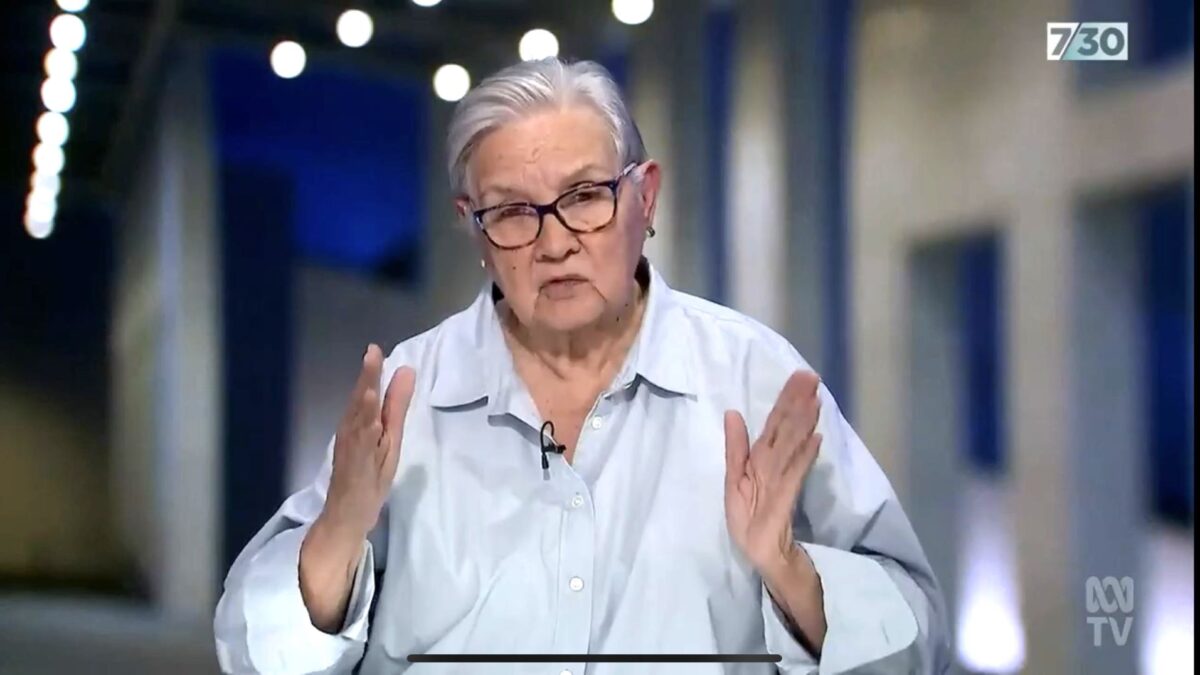Without a Voice, First Nations people are “fringe-dwellers” and “outsiders”: Yes campaign leader


Pat Anderson AO appeared on ABC's 730 on Wednesday night. (Image credit: Screen image from 730)
Uluru Dialogue Co-Chair Pat Anderson AO has shared with ABC’s 730 program how First Nations people feel deep down about not officially being acknowledged as the original inhabitants of Australia and not having a Voice on policies and laws which specifically affect their lives.
Asked to share her own story about growing up in the Northern Territory and of having her mother taken from her during the Stolen Generation, Ms Anderson described to 730 host Sarah Ferguson that her people felt like outcasts who were always living on the edge of society without actually being a true part of it.
Ms Anderson said many First Nations people still feel like that today.
“Most First Nations people know that the history of this country is bloody and bitter,” she said “and that it's full of pain and anger and distress. We've been trying for a long time to get various forms of acknowledgement, recognition, or to be included in the political life of the nation. We've been totally excluded by all kinds of segregation, both political and social.
“I grew up in Darwin in a parap camp, and I'm very proud to say so. All of those people in the camp were herded there. We had lots of camps around Darwin, as there were in every little town in Australia - there were these communities.
“We lived on the edge of town; there was an old word which was used to describe us - we used to be called ‘fringe-dwellers’.” Ms Anderson told Ms Ferguson that Constitutional recognition via a Voice for First Nations people was fundamentally a simple concept at its core.
“A Voice to parliament is not rocket science; is so very simple - I feel silly sitting here and having to explain it,” she said.
“Disadvantages in housing is still a huge issue in the Northern Territory, as it was when I grew up. Schools don't necessarily cater for our kids. If a Voice was in place today, we’d have the wraparound services available for those families who need them.
“With a Voice, we will be able to deal with things as they arise and not have to continually explain ourselves to new governments; we would have the mandate of the Australian people to sit down with the bureaucracy of the day and talk through these issues and alert them to what's happening, so we can head these problems off at the pass, so to speak, before they become larger issues.
“Up to now we have been fringe-dwelling, albeit to varying degrees across the country, but nevertheless we are the outsiders and we're knocking on the door, as we have been for generations. There is a really good roadmap there on the table. It's simple. It's very clear, and I think it will move the country forward.”
Ms Anderson, an Alyawarre woman, also dismissed the latest round of misinformation being spread among politicians and on social media. This week the Albanese government has been accused of hiding detail within the “full” Uluru Statement from the Heart, which conspiracy theorists have claimed is actually a 26-page document filled with hate-filled rhetoric.
“Let me explain; first of all, the Uluru Statement From the Heart is a one-pager - it's 439 words,” she said.
“Attached to that are pages called ‘Our Story’, which is a First Nations version of our history. It’s a true account and record of everything people said during the regional dialogues in 2016-17.
“A lot of the people who took part in the regional dialogues were distressed; this was shortly after $500 million had been taken from Aboriginal programs; a lot of the smaller wraparound services and others had disappeared overnight. So people were angry, upset and distressed.
“In fact, we hadn't counted on this, so the first few hours of every meeting was spent on people airing these grievances. We sat back and listened and heard what people said to us about what had happened to them.
“So that's what's in the ‘Our Story’ section; it didn't need people to accept it or to vote on it.”
